Published on
Updated
Reading 2 min.
in collaboration with
Dr Ghada Hatem (Gynecologist)
Medical validation:
October 20, 2023
Menopause is not easy. According to a recent British survey, 83% of menopausal women suffer from sleep problems. An update on this inconvenience, with Dr Ghada Hatem.
Menopause often leads to weight gain. But this is not the only side effect observed: during this great hormonal upheaval, women’s sleep is often disrupted. So much so that almost 83% of them suffer from sleep problems, according to a recent study carried out by the English bedding company Silentnight.
More than 2 in 3 women lose an average of 2.5 hours of sleep per night
According to the results of the Silentnight survey, conducted among 1,000 perimenopausal and menopausal women, 67% of them would lose nearly “2.5 hours of sleep per night“, which represents 37 fewer days of sleep per year.
Worse still, 83% of menopausal women suffer from sleep problems.
Disturbed nights which are not without consequences: they affect not only the physical well-being of the women concerned, but also their morale, their relationships and their career.
Nearly half of the women surveyed say that the lack of sleep caused by menopause has had a negative impact on their relationship; and more than two-thirds say the symptoms regularly lead to arguments with their partner.
At work, 44% of the women surveyed reveal that these restless nights have negative repercussions on their career.
According to Hannah Shore, Silentnight’s sleep expert, the women surveyed sleep so poorly it’s because “61% of them have night sweats, 41% suffer from insomnia and 23% have heart palpitations“.
Other potential nighttime inconveniences? Hot flashes, sleep apnea and restless legs syndrome, which manifests itself as an irresistible urge to move the legs associated with unpleasant sensations in the lower limbs occurring at rest.
According to experts, fluctuations in progesterone and estrogen levels during menopause explain these sleep disturbances, causing hot flashes and restlessness.
But according to Dr. Ghada Hatem, while it is true that sleep disorders can be linked to hot flashes, this is not an absolute truth.
“All older people have sleep problems. As we get older, we sleep less, we go to the toilet several times a night, we wake up earlier… Menopause is therefore sometimes a good thing.“.
The gynecologist nevertheless specifies that in the event of significant side effects linked to menopause, a “hormone treatment can help“.

